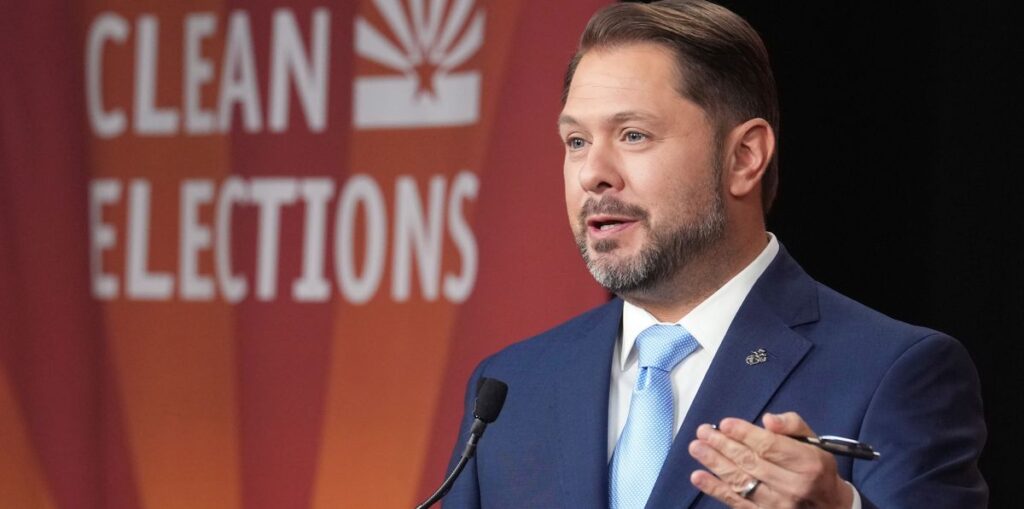Arizona has recently faced unprecedented heat, marking the hottest summer since 1896, with Phoenix registering a historic 113-day streak of temperatures exceeding 100 degrees Fahrenheit. As climate conditions continue to worsen, experts predict the upcoming decades will bring even more extreme heat. In this context, Democratic Senate candidate Ruben Gallego has put forth a significant proposal during a recent debate with Republican opponent Kari Lake: a push for expanded nuclear power. He argues that new reactors could be a quick solution to ensure that Arizona’s economy, particularly its manufacturing and residential sectors, can thrive despite the challenges posed by the escalating heat. Gallego emphasizes the need for a resilient power grid that accepts climate change as a reality and incorporates more baseload energy, which nuclear power can provide.
Baseload energy refers to the capacity to generate power consistently, independent of environmental factors, unlike renewable sources such as solar and wind energy that can be sporadic. While battery storage technology has made strides, it still faces significant limitations in long-term storage capabilities. As Arizona increasingly supplements its energy from renewables like solar power — which is plentiful in the region — there has also been a noticeable increase in dependence on natural gas as a backup energy source when renewable generation is insufficient. Although sources such as hydroelectric dams and geothermal energy can also provide stable electricity, environmental concerns and geographic limitations challenge their expansion. With the Palo Verde Generating Station already supplying 27% of the state’s electricity from nuclear sources, Gallego’s advocacy aligns with a wider trend of renewed public support for nuclear energy across the United States.
Arizona’s power landscape is heavily reliant on natural gas, accounting for 46% of the state’s electricity generation. The recent demand for electricity has surged, particularly during heat waves that force residents to use air conditioning, thus elevating their utility bills significantly. This climate-related surge in electricity usage coincided with a spike in natural gas prices, exacerbating the financial burden on Arizonans. In response to record demand and rising costs, the Arizona Corporation Commission approved an 8% rate hike for utilities in early 2024, leading to widespread concerns among residents regarding the affordability of energy. This has provided fodder for political critique, with challengers like Lake blaming Democrats and advocating for a return to fossil fuel development to lower costs.
Lake’s proposals, while emphasizing the need for reduced energy prices, lack specificity and largely recycle traditional Republican energy slogans. Her focus on reigniting fossil fuel projects, such as the controversial Keystone XL pipeline, does not directly address Arizona’s unique energy challenges. In contrast, Gallego’s arguments highlight the need for technological advances and investments in nuclear energy, alongside plans for sustainable extraction of minerals like uranium, which are crucial for energy transformation. This is especially relevant as the country seeks to reduce dependency on foreign energy sources, particularly in light of geopolitical tensions influencing oil and gas markets.
Both candidates tackle the critical issues of energy and water supply in Arizona, but their approaches differ significantly. Gallego has also underlined the critical need for strategic investments in water reclamation projects amidst an ongoing drought exacerbated by climate change. He warns that negotiations over dwindling water resources from the Colorado River will potentially lead to adverse impacts for agriculture in the region. On the other hand, Lake minimizes the urgency of the water crisis, focusing instead on long-term solutions without acknowledging recent water challenges acknowledged by experts. Her dismissal of Gallego’s concerns regarding changes in water policy and climate presents a stark contrast to Gallego’s proactive stance.
Polling data suggests that Gallego’s strategies resonate more with the electorate, giving him a lead over Lake, despite the competitive political landscape influenced by broader national factors. Arizona is experiencing a shift in energy dialogue with implications that extend beyond the immediate political arena. The debate between the candidates highlights a critical crossroads for Arizona’s energy future as the state navigates the challenges posed by climate change while aiming to maintain economic momentum and affordable utility costs for its residents. Ultimately, how Arizona balances nuclear energy expansion against a backdrop of climate challenges and resource management will shape its future amid increasing temperatures and demand for solutions.

